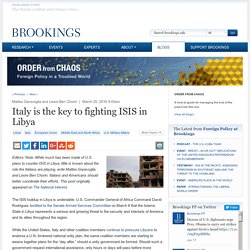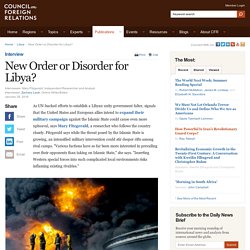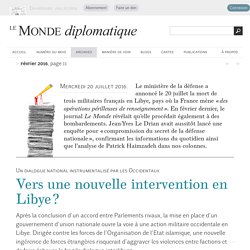

Italy is the key to fighting ISIS in Libya. Editors’ Note: While much has been made of U.S. plans to counter ISIS in Libya, little is known about the role the Italians are playing, write Matteo Garavoglia and Leore Ben Chorin.

Italians and Americans should better coordinate their efforts. This post originally appeared on The National Interest. The ISIS buildup in Libya is undeniable. U.S. Commander General of Africa Command David Rodriguez testified to the Senate Armed Services Committee on March 8 that the Islamic State in Libya represents a serious and growing threat to the security and interests of America and its allies throughout the region.
While the United States, Italy and other coalition members continue to pressure Libyans to endorse a U.N. Mary Fitzgerald on Libya and ISIS. Interviewee: Mary Fitzgerald, Independent Researcher and AnalystInterviewer: Zachary Laub, Online Writer/Editor January 29, 2016 As UN-backed efforts to establish a Libyan unity government falter, signals that the United States and European allies intend to expand their military campaign against the Islamic State could cause even more upheaval, says Mary Fitzgerald, a researcher who follows the country closely.

Fitzgerald says while the threat posed by the Islamic State is growing, an intensified military intervention could stir deeper rifts among rival camps. Libya Oil Deal Allows Small Step Toward Healing Political Divide. The political deal that allowed the restart of oil shipments from a port in eastern Libya provides short-term relief for cash-strapped authorities, but is only a small first step in a wider effort to unify the country’s rival factions.

Crude exports resumed from the port of Hariga after Mustafa Sanalla, chairman of Libya’s National Oil Corp., and oil officials based in the east reached an agreement in Vienna earlier this week. Speaking in an interview with local Ajwaa television channel on Friday, Sanalla said he hoped the agreement would lead to “the progressive reopening” of other oil ports including Ras Lanuf and Es Sider, the nation’s largest. A deal on that scale would require Fayez al Serraj, prime minister of the new United Nations-backed unity government in Tripoli, reaching an understanding with authorities in the east. Hardliners there have prevented at least five votes of confidence in the new administration since a peace deal in December.
Libya badly needs assistance, not intervention. ISIS in Libya ‘could relocate’ from Sirte - Al Arabiya English. UN Secretary-General Ban Ki-moon warned that ISIS fighters could set up new cells across Libya and north Africa as they are driven from their stronghold of Sirte.

Ban on Monday outlined the threat from foreign terrorist fighters (FTF) in Libya in a confidential report to the Security Council, obtained by Agence France-Presse. "The recent pressure against ISIL (ISIS) in Libya could lead its members, including FTFs, to relocate and regroup in smaller and geographically dispersed cells throughout Libya and in neighboring countries," Ban said in the report. The defeat of ISIS fighters in Sirte "appears to be a distinct possibility", leading many to flee south as well as west, to Tunisia.
"The future impact of scattered ISIL combatants on southern local armed groups may become an issue of concern," he said. Libyan forces allied with the UN-backed government in Tripoli have been battling to take Sirte from ISIS fighters for the past two months. The real reason the EU can't stop human smuggling from Libya. German navy soldiers take part in a drill for a search and rescue operation near the Sicilian port city of Catania, Italy, July 4, 2015.

(photo by REUTERS/Fabrizio Bensch) Author: Mustafa Fetouri Posted July 18, 2016 The European Union is taking steps to beef up its struggling efforts against human smuggling and trafficking from Libya, but until the country is politically stable, the changes aren't likely to be sufficient. Summary⎙ Print The EU’s Operation Sophia has so far failed to stop the smuggling of people from Africa to Europe, as the problem lies in Libya's tenuous government. The EU naval operation launched in September, called Operation Sophia, is designed to combat people smuggling humans from Libya and surrounding countries to European shores, mainly Italy.
However, instead of successfully targeting the smugglers and their networks, the whole operation has turned into a search and rescue effort. A British parliamentary report published in May called Operation Sophia a failure. Pourquoi la menace de l'Etat islamique en Libye est si sérieuse. INTERNATIONAL - Avec l'Irak et la Syrie, c'est le principal territoire où le groupe Etat islamique (EI) sévit dans le monde.

Militaires français tués en Libye : que sait-on de la présence de forces étrangères dans le pays ? Mercredi, la mort de trois sous-officiers français en mission en Libye a forcé Paris à communiquer sur sa présence militaire dans le pays.

Bien que les puissances étrangères se gardent de communiquer sur le sujet, des forces spéciales de tous horizons évoluent sur le terrain. En Libye, les Européens en quête d’un allié légitime pour lutter contre l’EI. Vers une nouvelle intervention en Libye ?, par Patrick Haimzadeh (Le Monde diplomatique, février 2016) La signature le 17 décembre à Skhirat, au Maroc, d’un accord d’entente nationale entre les représentants des deux Parlements libyens sous l’égide de l’Organisation des Nations unies (ONU) a ouvert la voie à la désignation, le 19 janvier, d’un gouvernement d’union nationale de 32 ministres dirigé par l’homme d’affaires tripolitain Fayez Sarraj.

Cela démontre la pertinence du dialogue engagé en septembre 2014. Malgré les tensions entre entités politiques et groupes rivaux, une grande majorité des adversaires qui refusaient de se rencontrer il y a encore un an ont accepté de faire des concessions.